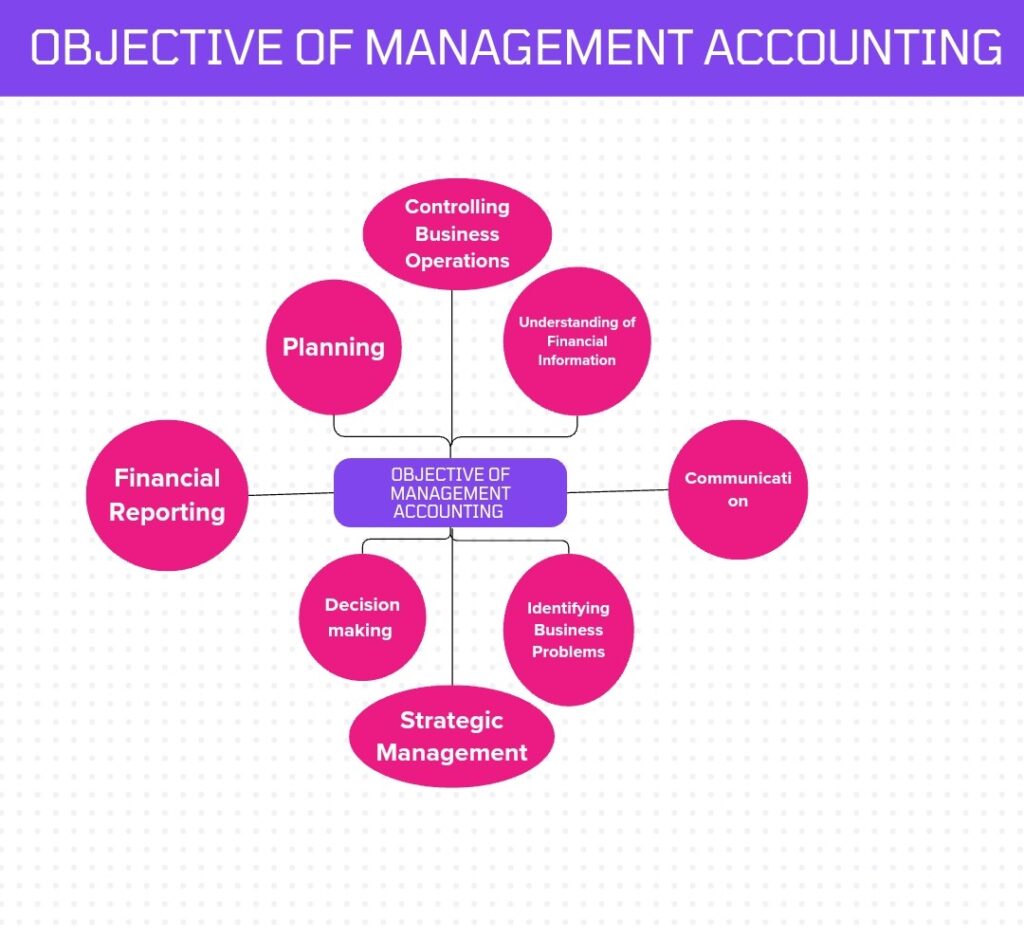In this blog we are going to discuss management accounting and objectives of management accounting.
What is Management Accounting ?

Management Accounting, is the process of identifying, evaluating, interpreting, and conveying financial information to managers in order for them to make educated decisions that support a company’s long-term goals.
In simple words we can say that Management accounting is the process of providing financial information and tools to help managers in decisions making .
Management accounting is utilized exclusively by the internal team of the organization, and this is the only thing that differentiates it from financial accounting.
In this procedure, financial information and reports, such as invoices Finance administration shares financial balance statements with management team of the company.
The goal of management accounting is to use these statistics. data and make better and more accurate decisions, controlling the company and business. Activities and development.
What do Management Accountants Do ?
Management accountants can operate in a variety of areas, including public, government, and private firms.
- Management accountant monitor, and maintain a company’s budgets.
- They Identify financial investment options that can help the organization.
- They prepare financial reports such as cash flow statements, tax paperwork, assets, and more.
- They use financial insights to make strategic decisions.
- They analyze data for performance enhancement.
- They Identify trends and opportunities for improvement.
- Management Accountant monitor and enforce compliance.
8 Important Objectives of Management Accounting

Management accounting objectives are to provide a complete framework for financial management to support business operations.
The main objectives of Management Accounting are –
1. Financial Reporting
Main objective of management accounting is to compile and present financial statements that accurately reflect the organization’s financial performance and cash flows. These statements are the balance sheet, income statement, cash flow statement, and statement of retained earnings.
2. Planning
Planning is a primary objective of management accounting, which focuses on establishing goals and taking steps to attain them.
Management accounting also employs historical data and market trends to generate forecasts that place the company in advantageous positions both in the long and near term.
3. Understanding of Financial Information
Another essential goal of management accounting is to convert complex financial data into an easily accessible format. Only via management accounting can complex financial statements be translated into clear and concise financial statements. It assists management in making suitable decisions for the benefit of the organization.
4. Decision Making
Decision-making is one of the primary reasons and objectives of management accounting.
Management accounting facilitates decision-making through the use of several methodologies such as costing, economics, and statistics. It aids in identifying the optimal methods and maximizing resource utilization. Management accounting allows firms to make more accurate decisions about complex issues.
Managers utilize financial data to calculate the profit and loss for various projects. This aids in the evaluation of an organization’s overall performance while also identifying opportunities for development.
5. Controlling Business Operations
Controlling business operations entails monitoring performance in order to facilitate change and maximize efficiency. It employs techniques such as budgetary control and variance. Analyze areas of low efficiency for improvement. Another way to improve efficiency is through cost management.
6. Communication
Communication is an important objective of management accounting. It is like a translator that helps business to communicate their financial situation to those who need to know.
When management wants to make any decision,they depends on information and this information is in the form of reports.
Reports are an essential component of management accounting. These reports functions as a messenger, that brings essential information to various levels of management. In this way, everyone is aware of what is going on and may decide what steps to take to maintain proper control.
This objective of management accounting helps in decision making by providing by necessary financial information requirede.
7. Strategic Management
All objectives of Management Accounting revolve around strategic management.It align financial analysis and planning with the company’s long term vision and strategic objectives.
Strategic Management helps organisation to adapt their strategy, adjust to market changes and maintain a competitive advantage by providing constant analysis and feedback.
The concept of management accounting isn’t obligated by any law. It can have its own structure tailored to the company’s needs.
The company has the freedom to do more study and investigation in certain areas. This allows them to concentrate on certain fundamental areas. The information provided enables them to make strategic management decisions. Management accounting plays a crucial role in launching new product lines or discontinuing old ones.
8. Identifying Business Problems
If a product is underperforming, or a department is experiencing unanticipated losses, managerial accounting can help us discover the root problem. Actually, if management is careful and provides frequent data and reports, they will be able to recognize the problem quite early on. This will allow management to get ahead of the issue. Management Accounting
How does Management Accounting Works ?
At its foundation, management accounting consists of several critical phases. The working process of management accounting is –
- Collecting financial Data: Financial data collection is a important part of Management Accounting,that ensures accurate and easily searchable financial reports on production cost ,overhead costs, revenue and common expense.
- Classifying and Analysing Data: Classified data in management accounting helps in identifying pattern and forecasting price changes by categorising costs based on production levels and analysing them to provide valuable insights.
- Budget Setting: Manager set budget based on historical data,not just for expenses they serve as a roadmap for financial plans, goals and forecasting,providing a roadmap for organisation. Budget plans are important for management accounting to accurately predict and estimate costs , utilising historical data and activity based costing methods to ensure the best accuracy in budgeting.
- Performance Analysis: Managers must actively analyse performance records,comparing actual figures against forecasts and budgets,to create better forecasts and address issues promptly.
- Preparation of Financial Report: Managers prepare financial reports using historical data for smarter forecasts and decisions, ensuring smooth communication with executives.
- Communicating Financial Information: Reports should be effectively communicated among management, executives and financial teams to facilitate easy understanding and analysis of historical data ,enssuring timely decision making.
Why management accounting is important?
Management accounting is important for companies because it provides internal decision-makers with the financial data they need to plan, control, and evaluate performance, ultimately supporting strategic objectives. It aids in informed decision-making, strategy planning, performance evaluation, and resource optimization.
